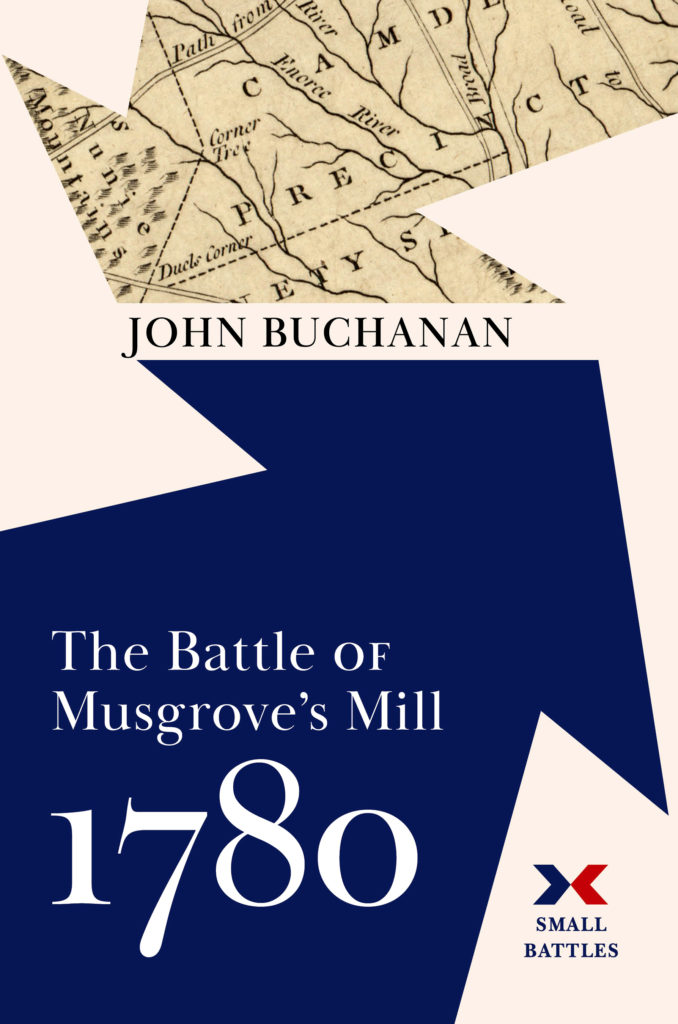

The Battle of Musgrove's Mill, 1780
$28.00 Add to Cart Save 25% on every book by joining our Book Club


On August 19, 1780, near a ford of the Enoree River in northwest South Carolina, a short and savage encounter occurred between Rebel militia and a combined force of Loyalist militia and Provincial regulars. Despite the Rebel’s being outnumbered more than two to one, it was an overwhelming victory for the American cause. The Rebels defended from the top of a ridge, inflicted heavy casualties on the Loyalist force as it advanced, then charged and drove the enemy from the field of battle. Just as Bunker Hill had done on a larger scale in Massachusetts, this clash of hundreds of soldiers in the Carolina backwoods invigorated the Rebel cause and led directly to the Battle of King’s Mountain, the turning point of the war in the South. This battle is also remarkable because instead of one leader the Rebel force was directed by a joint command of three colonels.
The Battle of Musgrove’s Mill, 1780, by award-winning historian John Buchanan, begins by describing the situation in South Carolina following the British invasion of 1780 before introducing the three colonels: Isaac Shelby, James Williams, and Elijah Clarke. These men led Rebel militia from North Carolina, South Carolina, and Georgia in an effort to disrupt British operations and their Loyalist support. The colonels and other leaders led mounted Rebel militia in a sweeping and bloody guerilla war that played an essential role in opening a path to the eventual British surrender at Yorktown and Britain’s loss of America.

John Buchanan is author of The Road to Guilford Courthouse: The American Revolution in the Carolinas, Jackson’s Way: Andrew Jackson and the People of the Western Waters, The Road to Valley Forge: How Washington Built the Army That Won the Revolution, and The Road to Charleston: Nathanael Greene and the American Revolution.
Small Battles: Military History as Local History
Mark Edward Lender and James Kirby Martin, Series Editors
Small Battles offers a fresh and important new perspective on the story of America’s early conflicts. It was the small battles, not the clash of major armies, that truly defined the fighting during the colonial wars, the American Revolution, the War of 1812, and the hostilities on the frontiers. This is dramatic military history as seen through the prism of local history—history with a depth of detail, a feeling for place, people, and the impact of battle and its consequences that the story of major battles often cannot convey. The Small Battles series focuses on America’s military conflicts at their most intimate and revealing level.
“Buchanan has given scholars and enthusiasts of Revolutionary military history an engaging, well-researched account of an important—if small—battle and the people who fought it.”—Journal of Southern History
“The Battle of Musgrove’s Mill, 1780, by John Buchanan, is another short, well-written, and enjoyable study of an important, but often overlooked battle of the American Revolution. Musgrove’s Mill is the immediate precursor of the pivotal Battle of King’s Mountain. The battle itself was short (as little as 15 minutes, but possibly up to approximately 1 1/2 hours), but intense. Consequently, Buchanan’s battle narrative is likewise short, but he provides much context necessary to understanding the American Revolution as a bloody and vicious civil war in the southern colonies.”—Journal of America’s Military Past
“This small book is very interesting and definitely adds to the growing body of literature forcing awareness that the Revolutionary War was more than Lexington, Concord, Valley Forge, and Yorktown. Buchanan writes well; his outstanding knowledge of the Southern Theater is demonstrated as with his prior overviews. This book is easy to read but still loaded with good, detailed information about the time, the people, and the War.”—Lawrence E. Babits, author of A Devil of a Whipping: The Battle of Cowpens
“A knockout study by the reigning laureate of the American Revolution’s southern campaigns. The impact of Musgrove’s Mill is unsung but mighty. Who better to write about it for us than John Buchanan?”—Andrew Waters, author of To the End of the World: Nathanael Greene, Charles Cornwallis, and the Race to the Dan
“Full of insights of the southern campaign, this book brings to light the context and significance of this largely overlooked battle and the rag-tag personages involved. Buchanan’s prose and storytelling genius make this book a delight to read for both the scholar and the general reader. A much worthy addition to a resurgence in Revolutionary War scholarship and highly recommended.”—Steven D. Smith, coauthor of Leading Like the Swamp Fox: The Leadership Lessons of Francis Marion